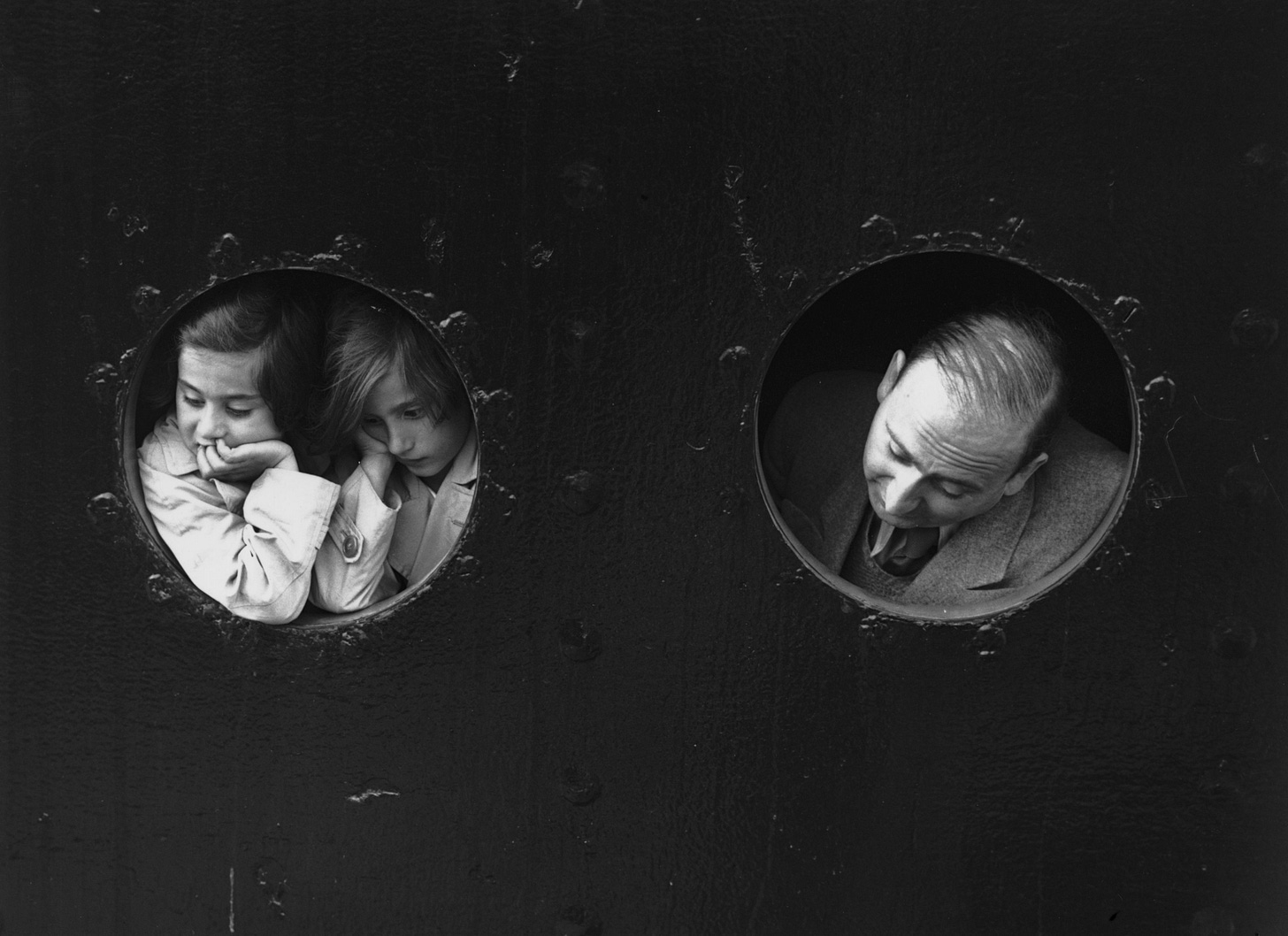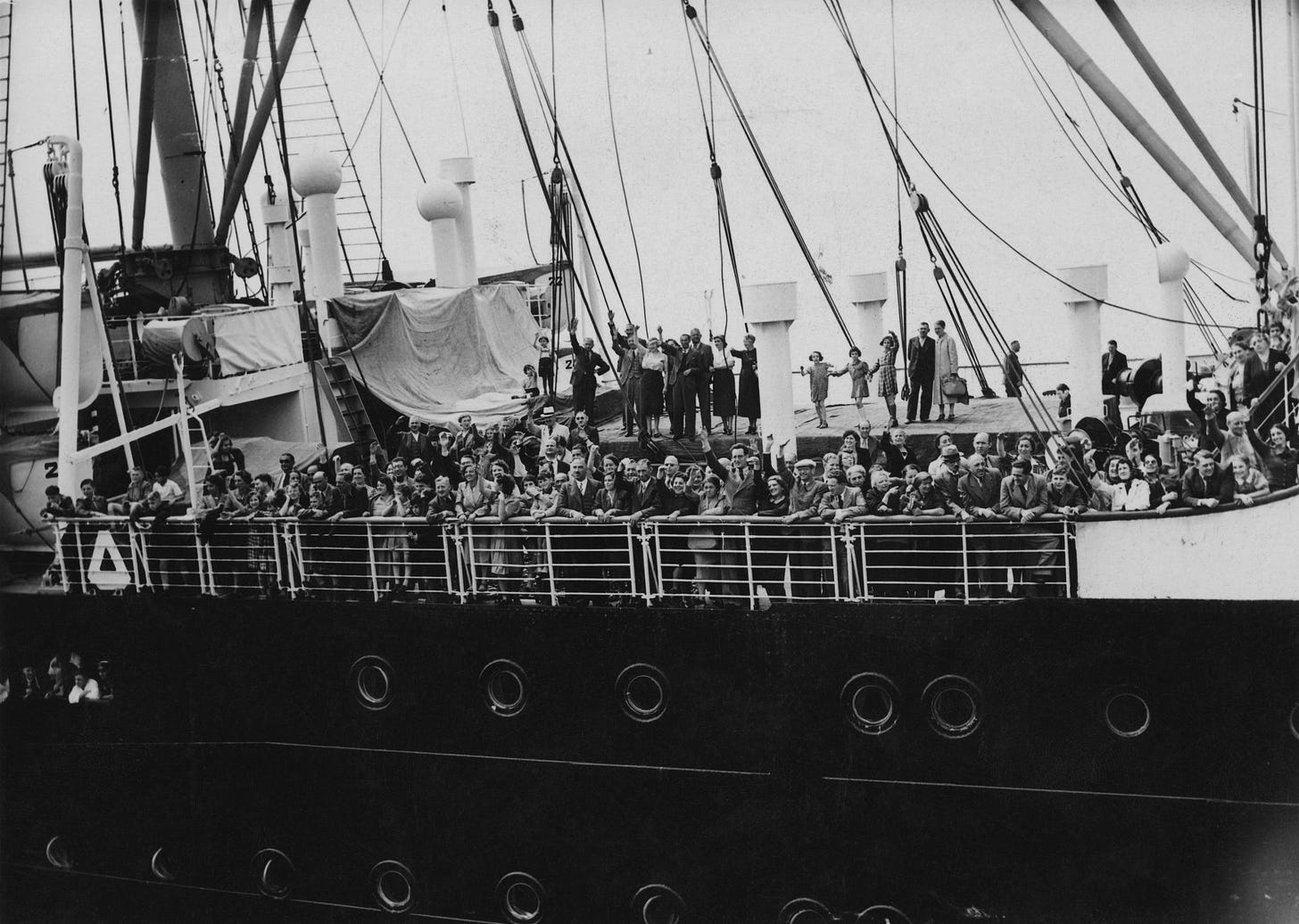Reliving a Sordid Chapter in American History
The Holocaust, refugees, and haunting echoes
17th June 1939: German Jewish refugees, looking through portholes aboard the Hamburg-Amerika liner 'St Louis' on arrival at Antwerp, where a temporary home was found for the 900 refugees aboard. Most were later deported. (Photo by Gerry Cranham/Fox Photos/Getty Images)
“It’s not one of the things that will go down in the long annals of good things America did. It goes in a different book,” Historian Deborah Lipstadt
I’d planned a whole different newsletter this morning, but my colleague Mona Charen urged me to watch Ken Burn’s “U.S. and the Holocaust,” and now I can’t get it out of my mind.
I don’t know how many Americans know the story of the St. Louis, but it should haunt us.
For decades we’ve told ourselves that we are a “nation of immigrants,” and we look back on the Thirties and the Forties as the Greatest Generation. And, of course, we are, and they were. But that’s not the whole story, is it?
As the Holocaust swept across Europe, Americans knew. And, yet, we kept the door shut, even as desperate refugees sought asylum here. Burns documents “the tragic human consequences of public indifference, bureaucratic red tape and restrictive quota laws in America.”
“It is a fantastic commentary on the inhumanity of our times that for thousands and thousands of people a piece of paper with a stamp on it is the difference between life and death,” Dorothy Thompson wrote in 1938.
But, really, it was so much worse than that.
We knew, and we turned them away anyway. It was an act of inhumanity that should be almost incomprehensible but, instead, it seems too familiar. Americans justified their indifference — and rationalized sending back Jews to certain death — using arguments that we will all recognize.
The Great Replacement Theory has a longm dark history….
“If I had my way,” said Senator Robert Reynolds of North Carolina declared, “I would today build a wall about the United States so high and so secure that not a single alien or foreign refugee from any country upon the face of this earth could possibly scale or ascend it.”
“They were afraid,” says Dr. Viola Bernard, “of the argument that Europe was trying to dump all its Jews on the United States and anti-Semitism certainly was a powerful ingredient, frequently covert instead of overt.”
Opponents posed as American patriots.
More than 100 patriotic societies insisted, "Charity begins at home." A cousin of the President, Laura Delano, commented, "Twenty thousand charming children would all too soon grow into 20,000 ugly adults." The President was aware that the bill [to allow more refugees] was not politically popular and, pressed for his opinion, he elected to take no action. The bill eventually died in committee.
Burns reminds us that Father Charles Coughlin’s weekly radio broadcasts reached more than three million people. In the Thirties, he rallied opposition to helping Jews escape Hitler with a mixture of anti-Semitism, conspiracy theories, and rants against globalism. “The system of international finance which has crucified the world to the cross of depression,” Coughlin told his audience, “was evolved by Jews for holding the peoples of the world under control.”
And then there was the St. Louis.
In 1939, more than 900 Jews fleeing persecution boarded the ship, relying on promises that they could find safety in Cuba, as they awaited sanctuary in the United States. But when they arrived in Havana, Cuban officials reneged, giving into anti-Jewish agitation. Burns tells the tragic story.
Friends and relatives watched as despairing passengers waited aboard ship during a week of futile negotiations. The passengers telegraphed President Roosevelt, requesting temporary haven.
Their plea fell on deaf ears.
Finally, the ship was forced back to Europe, sailing first for days along the Florida coast. America would make no exception to its rigid immigration laws.
The New York Times described the St. Louis as the “saddest ship afloat today.”
No plague ship received a sorrier welcome. At Havana, the St. Louis’s decks became a stage for human misery. There seems to be no help for them now. The St. Louis will soon be home with its cargo of despair.
In Burns’s documentary, we see their faces and can feel their anguish and sense of betrayal, knowing that so many of them would later be killed in concentration camps and gas chambers. (Although they found temporary haven, more than 250 of the passengers would be killed after the Nazis invaded the countries where they had settled.)
Refugees arrive in Antwerp on the MS St. Louis after over a month at sea, during which they were denied entry to Cuba, the United States and Canada, 17th June 1939. The St. Louis had originally sailed from Hamburg to Cuba, carrying over 937 mainly German-Jewish refugees from Nazi persecution. (Photo by Three Lions/Hulton Archive/Getty Images)
This is an appalling and sordid chapter in American history. But, for most Americans, the stain has been whitewashed, and we know why. With the advent of WWII, America had to rally the nation and in order to do so, it had to tell itself a different story. But propaganda is not history, and so it seems we’re doomed to repeat some of our darkest moments.
Burns very much wants us to hear the echoes: Charlottesville, with its chants of “Jews will not replace us,” the demonization of immigrants, the passion for walls, the xenophobia, and the brutal indifference to the huddled masses yearning to breathe free.
He completed the documentary before the latest stunts that used refugees as human pawns, but he would not have been surprised. We’ve been here before.
**
Burns doesn’t have to drive the point home, because it’s so obvious: rhetoric about immigrants/refugees as invaders has become routine.
"We no longer have a border. Our country is being invaded. It's an invasion by millions of illegal aliens,” Trump declared at a recent rally. Arizona’s GOP gubernatorial candidate Kari Lake, echoes him, calling immigrants “rapists” coming the across the border.
Here’s Senator John Kennedy: "President Biden will let any illiterate gang banger, oftentimes with drugs, come right on in.”
Again, none of this is new. Before the warnings about Mexicans, Americans were warned about the “invasion” of Chinese immigrants.
The title of the August 27, 1873 San Francisco Chronicle article, "The Chinese Invasion! They Are Coming, 900,000 Strong", was traced by The Atlantic as one of the root causes of the spread in the late 2010s of "immigration invasion" rhetoric.
**
For a time, conservatives tried to back away from the long tradition of nativism. Ronald Reagan, who had his own mixed record on race, famously spoke about America as a "shining city on a hill,” which he envisioned as “a city with free ports that hummed with commerce and creativity, and if there had to be city walls, the walls had doors, and the doors were open to anyone with the will and the heart to get here.”
Before the Trumpian embrace of border walls, Bill Bennett had described what he called “the gates test.” In 2009, he wrote in National Review:
Someone can judge a country by which direction people run when the country erects gates: Do they flee in, or do they risk life and limb to get out? (Over the course of some four decades until 1989, some 2.5 million people had fled East Germany and many were shot trying to flee.) There was no better symbol of the gates test than the Berlin Wall.
Bennett noted that two years before the wall fell Reagan had gone to Berlin and described it as “a gash of barbed wire, concrete, dog runs, and guard towers.”
Perhaps the most famous words of Reagan’s presidency were those he uttered that summer day in 1987: “General Secretary Gorbachev, if you seek peace, if you seek prosperity for the Soviet Union and Eastern Europe, if you seek liberalization: Come here to this gate! Mr. Gorbachev, open this gate! Mr. Gorbachev, tear down this wall!” And now, within hours of the granting of travel by the East German government, the German citizens were, themselves, taking pickaxes to the scar.
Now, of course, Bennett has made his peace with wall-building Trumpism, and the National Review has become a fanzine for Florida Governor Ron DeSantis, who has used the plight of asylum seekers as a trigger-the-libs punchline.
**
But this is the haunting question: Was anyone responsible for turning back the St. Louis proud of their role? How does history remember them?
And…
How will their successors look back on their own mockery of human suffering?
And how will history remember them?
Speaking of history… and warnings
ICYMI: The history of the Trump presidency is also a warning of a Trump 2.0 — this time, he would know how to pull the levers of power to get what he wanted. You can listen to my conversation with Peter Baker and Susan Glasser here.
A reminder about Ginni Thomas
She’s nuts.
On Thursday, the wife of SCOTUS Justice Clarence Thomas spoke with the January 6 Committee. She still thinks the 2020 election was stolen. Because, of course.
Two days after the 2020 election, Virginia Thomas, the wife of Justice Clarence Thomas, texted an old friend, Mark Meadows, the chief of staff to President Donald J. Trump.
She sent messages that had been making the rounds on pro-Trump sites, where anger over the election echoed her own raw feelings, including this passage: “Biden crime family & ballot fraud co-conspirators (elected officials, bureaucrats, social media censorship mongers, fake stream media reporters, etc) are being arrested & detained for ballot fraud right now & over coming days, & will be living in barges off GITMO to face military tribunals for sedition.”
Then she added of this fanciful, if chilling, set of conspiracy theories: “I hope this is true.”
The appalling Judge Cannon
Former DOJ official Andrew Weissman:
**
Speaking of the Mar-a Lago search
Over at Just \ecurity, Ryan Goodman has put together a useful timeline that you should bookmark:
Readers should decide for themselves what conclusions they reach based on the record below. On our view, the record as a whole points to Trump’s culpability based on evidence that
Trump was warned in late 2021 by his former White House lawyer that it was unlawful to retain the documents, especially classified information;
Trump personally sorted through the documents in late 2021;
Trump’s personal knowledge and possession, access, and control of the documents is indicated by the quantity, content, and location of documents with classified markings (including intermingled with personal belongings) and by his admissions on Truth Social;
Trump repeatedly stated privately that the documents were his to possess and he was not willing to deliver them to the government;
Trump aides repeatedly tried to get him to return the documents to the government;
Trump was repeatedly put on notice by Archives and Justice Department that his retention of the documents were unlawful and a potential threat to national security;
Trump was apparently involved in obstructive acts of trying to conceal documents from the government after receiving a subpoena.
Quick Hits
1. Putin Compounds His Bad Decisions
David Kramer, in today’s Bulwark:
Putin is either killing off or driving away part of a generation of young Russian men and alienating other parts of society. In Dagestan, a poor Muslim region in the Russian Caucasus that already has borne a disproportionate share of losses in the war, protests have erupted against Putin’s decision to send even more of its citizens to fight and die for a losing cause. On the day Putin announced the mobilization, thousands of Russians turned out on the streets across the country and many others fled to neighboring states like Georgia, Turkey, and Kazakhstan.
2. Will Putin Go Nuclear?
Tim Miller is out with his latest “Not My Party”:










Welcome to the backdrop of my life. My dad was a Holocaust survivor from Poland who managed to escape from his town's ghetto before it was emptied and his family was killed. He rarely missed an opportunity to express his hatred for FDR though I learned from Burns' film that the reality was quite a bit more complicated. He died this past June having told my children and me stories of all he experienced and always warned it could happen here. The silver lining around his death was that as early dementia set in during his last year he was unable to process the level of anti-semitism and anti-immigrant feeling that we now see. It was amusing though to try to convince him that yes, Dad, the president of Ukraine is really Jewish.
Charlie rightly focuses on the massive moral failures surrounding the Holocaust. Perhaps an equally hard lesson to learn, in the sense of looking in the mirror, is that FDR's political realism about the nature of the American people was absolutely necessary. This would also seem to hold lessons for our time. We need desperately to put together a lasting coalition to defeat Trumpism. This means that compromise is the order of the day within that coalition. Joe Manchin and Bernie Sanders make strange bedfellows. But this is what we need.